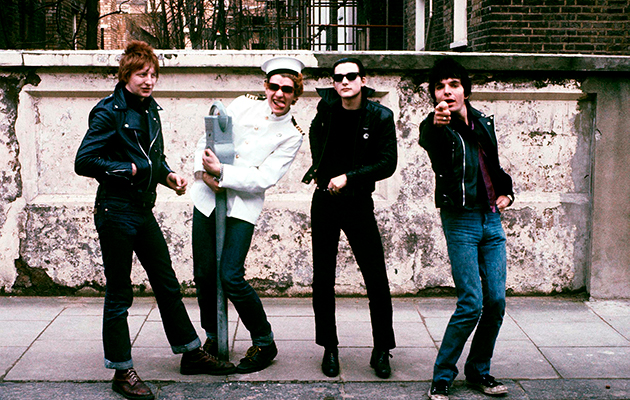The reunion, when it came, happened so quickly that today Vanian still doesn’t think they ever really broke up. In August, Scabies and Sensible agreed to play a few shows as The Doomed with Lemmy on bass. James was not invited, nor did he participate in the band’s subsequent recordings. “Brian has a pure rock’n’roll philosophy – keep it real, crank the guitar, thrash the drums, keep it raw, avoid studio effects, no flanging, synths, dubs, he’s been true to that all his life,” says Sensible. “I respect that. It was his mission when I met him and it’s never changed. But I love playing with sound and want to try everything. I wanted to hear punk rock with a psychedelic tinge. We decided early on never to make the same record over and over – and we never did.”
Without James, Vanian, Sensible and Scabies enjoyed the chance to flex their songwriting chops. Signed to Chiswick, they found themselves with an unexpected hit on their hands – “Love Song”. The powerful Algy Ward was now on bass, and he recalls how Roger Armstrong would encourage them to experiment at RMS rehearsal studio in Selhurst. “They’d give us money and tell us to go and make some noise somewhere else.” Here, Sensible and Scabies could trial a diverse range of ideas: piano ballads, soundscapes, hard rock and shiny pop. It was an impressive package: Scabies brought raw power, Sensible had the melodies and Vanian provided atmosphere. But the philosophy remained the same: anything goes. Machine Gun Etiquette, released in November 1979, kicked off an unusually fertile period for the band, including The Black Album and Strawberries. Yet though The Damned gave full rein to their creative impulses, with satisfying results, they weren’t averse to indulging in their beloved toilet humour. Quite literally, as it transpired. “All through Strawberries, there’s a noise between the tracks,” says Vanian. “What nobody knows is that it’s a toilet being flushed. On other songs we used an egg whisk and slowed it down with loads of reverb. We used the sound of jeans being torn. We always wanted to add something that would make a difference.”
But the band still couldn’t break through. They had a reputation as troublemakers that discouraged major labels. Eddie & The Hot Rods’ Paul Gray replaced Algy Ward on bass in 1979 and he recalls, “The consensus in the industry was that we were too rough to handle – nobody could tell us what to do.”
Sensible and Scabies were usually at the centre of any trouble. Andy Le Vien, who ran RMS in Selhurst, had to ban them after they set off a fire extinguisher. “I was terrified when they came in,” he says. “They had a reputation of being rough boys but tended to keep the incidents between themselves rather than taking them out on the studio. One time they had a terrible fight and ended up embedding a guitar into a concrete wall. They were very volatile, but they were very young.”
On another occasion, Chiswick suggested they hire a barge for rehearsals. “The idea was that if we were on a barge, we wouldn’t just go down the pub,” says Gray. “Firstly, Vanian never turned up, then Captain and Rat made me send my bass back so there would be more room for beer. We spent the entire week going up and down the canal, stopping at every pub, shooting people with air rifles and filling the locks with washing-up liquid so the bubbles went over the side as we revved the engine. There was no music. We set a mattress on fire and the boat was shot to pieces. We had to abandon it, ’cos it was sinking.”
Eventually, Gray walked out in ’83 after a row with Scabies. Meanwhile, Captain Sensible had become an unlikely solo star, scoring a No 1 with “Happy Talk”. His success allowed old rivalries to bubble, but it also highlighted the problem with
the band’s image. Scabies, Sensible and Vanian presented three alternative visions that made it had to work out which clan The Damned belonged to – punk, pop or goth. Scabies had one solution for both these problems. “We did The Young Ones in 1984 and I looked at the band and thought there was one person who looked like the odd man out and he was in the red beret and tutu,” says Scabies. Sensible was out as the band focused round Vanian. “We did punk, we did experimental, now it was time to be commercial,” says Scabies. The Damned went goth.
Vanian’s colleagues describe the singer as an “enigma”, but all agree that he loved to wear black. “Dave was always so mysterious,” says Roger Armstrong. “You’d never catch him out. Once I saw him at his place. He was working on his bike in his overalls. I thought I’d finally caught him dressed down but when he took off his overalls, he was wearing an immaculate white shirt and pressed trousers underneath.”
With Bryn Merrick and Roman Jugg on bass and guitar, The band signed to a major and cut their most unified LP since their debut. Phantasmagoria (1985) brought chart success and fans went along with it – Scabies recalls the punks moving to the front for “New Rose”, to be replaced by goths when they played “The Shadow Of Love”. Vanian was tickled by the sudden transformation in his mates.
“To look a certain way takes a bit more work,” he says, “and I’d be smirking as they stood in front of a mirror crimping their hair.”


